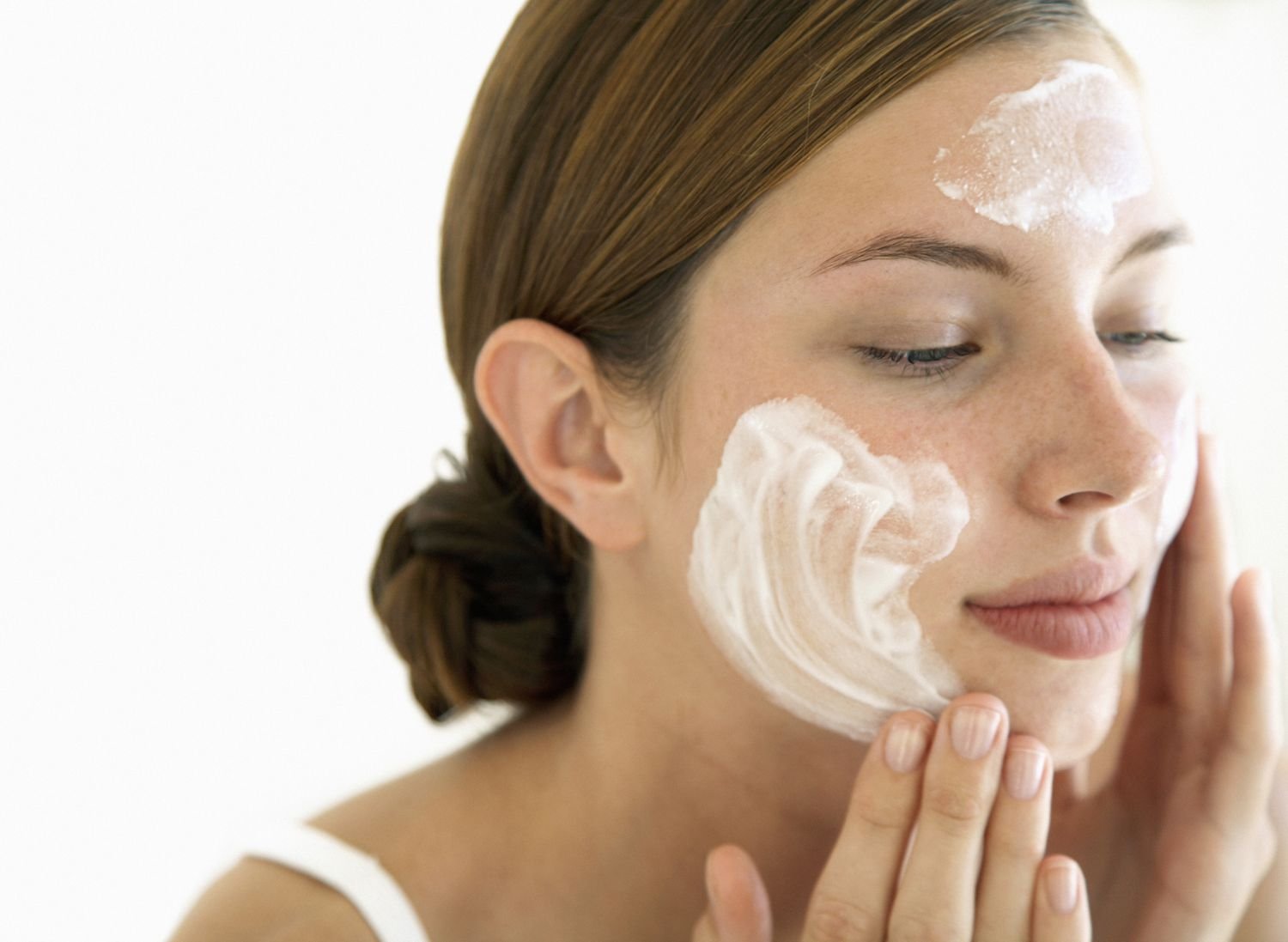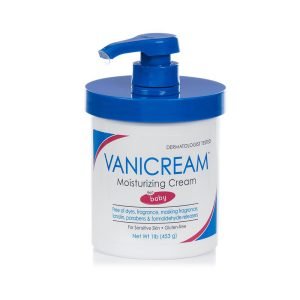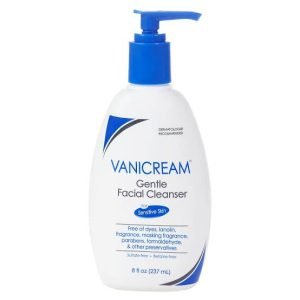PUBLISHED ON 2023/11/02 at 8:30 PM
We independently evaluate all recommended products and services. If you click on links we provide, we may receive compensation.
Vanicream For Perioral Dermatitis

It’s a classic for a reason. Yes, that’s right. Vaincream has been around the skincare block for a while now. And while it might not have the same fame as brands like CeraVe, people suffering from perioral dermatitis swear by its products like gentle cleansers and moisturizers.
So, if you’re sick and tired of your perioral dermatitis, Vanicream might just be the solution you need. Vanicream’s moisturizing cream is formulated to soothe dry, irritated skin like yours. It claims to be an ideal moisturizing formula for dry skin associated with skin issues like atopic dermatitis (eczema), psoriasis, and, of course, PD.
And its cleanser also claims to do wonders for dry, irritated skin. But does it really work for perioral dermatitis? Does Vanicream, in fact, have the most effective and best moisturizer for perioral dermatitis?
We’ve used our three years of solid skincare experience, product research, and actual customer reviews to bring you real answers. So keep going to discover if Vanicream’s products can actually calm your flaky skin and deserve a spot on your dressing table.
Yes, Vanicream can be a suitable option for periorificial dermatitis. It’s a brand known for its gentle and sensitive-skin-friendly products. While it has not been clinically researched specifically for this condition, its mild and moisturizing properties make it a favorable choice for those with periorificial dermatitis.
Vanicream Review: Do Its Products Help?
Yes, Vanicream is definitely one of the best product in treating PD. It’s moisturizing properties and non-irritating ingredients, makes it a preferred option for individuals dealing with this condition.
Vanicream stands out as a beacon of hope for individuals battling perioral dermatitis. Their commitment to creating gentle, fragrance-free, and dermatologist-recommended products has made them a go-to brand for those seeking relief from this challenging skin condition.
With Vanicream’s specialized formulations, individuals can find solace in products that are not only effective but also incredibly mild, ensuring that their skin is treated with the utmost care. When it comes to managing perioral dermatitis, Vanicream proves to be a trustworthy ally, providing comfort and confidence in every use.
How Does It Help?
Vanicream is a skincare product that is often recommended for people with PD due to its gentle and minimal ingredient formulation. Here’s how Vanicream can help in treating PD:
Minimal Ingredient Formulation: Vanicream products use minimal ingredients, avoiding common irritants like fragrances and preservatives. This is crucial for PD sufferers, as it helps prevent potential triggers that worsen the condition.
Gentle and Non-comedogenic: Vanicream products are often gentle non-comedogenic, meaning they are less likely to clog pores and contribute to the development of acne-like bumps, which is a common concern in PD.
No Fragrances or Common Irritants: Unlike many skincare products loaded with fragrances and harsh additives, Vanicream products are usually fragrance-free and free from common irritants.
Moisturization: PD can often result in dry, flaky, or irritated skin. Vanicream’s moisturizing products can help hydrate and soothe the skin, which is essential for managing the discomfort associated with this condition.

How Can You Tell You Have Perioral Dermatitis?
The condition is often referred as Periorificial dermatitis can cause skin and facial rash which can lead to
- Swollen Skin
- Scaly Skin
- Dry Skin
- Flacky skin
It can spread to areas like the eyelids, nose, forehead, neck, genitals and other regions. Additional symptoms may include itching, burning, or stinging. However, it is important to note that the condition is not contagious.
What Are the Causes of PD?
The exact cause is not always clear, but it can be triggered by factors like the use of
- Steroidal creams,
- Oral or inhaled steroids
- Fluoride in toothpaste
- Sodium lauryl sulfate in shampoo
- Overuse of facial products
- Stress, and hormonal factors.
In some cases, removing the triggering product from your skincare routine can lead to a cure, while more severe cases may require medical intervention.
Products and Treatments You Should Try For PD
There are several steps you can take as a treatment for periorificial dermatitis.
The first step is to revisit your skincare routine. Remove any recently added products, like new face washes or cosmetics, especially those applied around the mouth.
Opt for mild and fragrance-free skincare products, steering clear of harsh chemicals and strong scents until the rash clears up.
Consider pausing the use of acne creams or cleansers with active ingredients such as benzoyl peroxide or salicylic acid. In some cases, even dental products containing fluoride can exacerbate the condition, so switching to a fluoride-free option for a few weeks can be helpful.
Gentle Skincare Products Should be Preferred:
Gentle skincare products play a crucial role in the healing process. Look for accessible options like
- Vanicream Facial Cleansers
- Dove soaps and lotions.
- CeraVe facial moisturizers
- Neutrogena facial cleansers and lotions.
These can help recover your skin, alleviate redness, dryness, and flaking, and provide relief from symptoms like itching. Choosing gentle products is key to managing periorificial dermatitis effectively.
Products and Treatments To Avoid With PD
Not all lotions are suitable to use while treating periorificial dermatitis. As it is discussed previously to prioritize the use of gentle cleanser and products. Avoid harsh products with chemicals, as they can irritate sensitive and itchy skin.
Antifungal treatments
Antifungal treatments, such as miconazole (Monistat) or clotrimazole (Lotrimin), might appear promising for periorificial dermatitis. These creams possess anti-inflammatory properties that can alleviate redness and soothe itchy skin while supporting the healing process.
However, it’s important to note that the effectiveness of antifungal treatments for periorificial dermatitis lacks scientific backing. Not all cases of perioral dermatitis stem from a fungal infection.
In fact, if your condition is bacterial in nature, using antifungal cream may worsen the situation. So, it’s essential to pinpoint the cause of your periorificial dermatitis before considering such treatments.
Steroid treatments:
Steroid treatments, like hydrocortisone creams, may seem tempting due to their affordability and accessibility.
Hydrocortisone is a common anti-itch ingredient found in many lotions. However, using these creams to treat periorificial dermatitis is not advisable. In some cases, overuse can actually contribute to the rash. When you cease using hydrocortisone cream, the rash may worsen temporarily, but it’s important not to resume using it. Your skin will readjust and begin to heal in a few days.
It’s crucial to avoid any form of steroid cream for periorificial dermatitis, even if it was prescribed by a doctor. If you’re currently using a prescription cream and develop periorificial dermatitis, consult your doctor to discontinue or adjust your prescription.
Natural Remedies To Beat PD At Home
Consider natural remedies for periorificial dermatitis, but ensure they’re gentle and moisturizing for your skin. Some people opt for apple cider vinegar or tea tree oil, which is not recommended by the dermatologists as they can strip your skin barrier, causing more irritation.
A better choice is soothing and moisturizing options like
- Aloe vera
- Coconut oil
- Shea butter
- Cocoa butter
- Almond oil.
While not clinically proven for periorificial dermatitis, they’re known for reducing redness and are kinder to your skin than harsh alternatives.
Before trying any natural remedies, consult a medical professional to ensure they won’t interact with your current medications and are safe for your skin. If your rash worsens, stop using them immediately. If at-home remedies don’t work, consult a healthcare professional for tailored treatment options.
Oral antibiotics:
Oral antibiotics are a trusted treatment for periorificial dermatitis, clearing underlying infections that trigger this rash. To prevent antibiotic resistance, your dermatologist may suggest decreasing doses during your treatment.
Common antibiotics for this skin condition include doxycycline or minocycline, with the overall treatment duration ranging from 3 to 12 weeks.
Vanicream Moisturizing Cream
Vanicream Moisturizing Cream is a true hero in the world of skincare, especially for those dealing with sensitive skin conditions like perioral dermatitis. This gentle moisturizer is a game-changer, offering deep hydration without causing any irritation. It’s a simple yet powerful solution for maintaining soft and supple skin.

- Vanicream Moisturizing Cream provides intense hydration, leaving the skin feeling nourished and moisturized.
- Perfect for individuals with PD, as it does not aggravate the condition, offering relief from dryness and discomfort.
What We Don’t Like:
- Deep Hydration
- Safe for Perioral Dermatitis
- Non-Greasy
- Dermatologist Recommended
What We Don’t Like:
- Packaging
- Thickness
Key Ingredients:
- Purified Water
- Petrolatum
- Cetearyl Alcohol
Vanicream Gentle Facial Cleanser Formulated Without Common Irritants for Those with Sensitive Skin
This face cleanser is both effective and gentle on sensitive and dry skin. It’s perfect for daily use, removing dirt, oil, and makeup without causing dryness. Formulated to avoid common irritants and harsh cleansers. It’s sulfate and gluten-free property makes it suitable as a treatment for periorificial dermatitis.
Notably, it has earned the National Eczema Association Seal of Acceptance, making it a trusted choice for sensitive skin. Vanicream products are fragrance-free, with no masking fragrances.

What We Like:
- Gentle Cleansing.
- Non-Drying
- Fragrance-Free
- Suitable for Perioral Dermatitis
- Dermatologist Recommended
What We Don’t Like:
- Lack of Foam
- Packaging is not user-friendly.
Active Ingredients:
- Hyaluronic Acid (Skin conditioner – humectant)
- 6 Ceramides (Skin conditioner)
- Glycerin (Skin and hair conditioner – humectant)
- Sodium cocoyl glutamate (Surfactant – cleansing)
How to Apply Vanicream Gentle Facial Cleanser?
Morning Routine:
- In the morning, generously apply a gentle skin cleanser to wet skin.
- Lather and rinse, then gently pat dry with a towel.
- Follow with a moisturizer suitable for delicate skin.
- Finish with sunscreen for protection.
Evening Routine:
- For your evening routine, generously apply the gentle skin cleanser to wet skin.
- Lather, rinse, and pat dry with a towel.
- Follow with The Ordinary Azelaic Acid Suspension.
- Complete your routine with a moisturizer designed for delicate skin.
Final Verdict
In dealing with periorificial dermatitis, prevention is key. Avoid hydrocortisone creams and excessive sun exposure. Consider switching to a non-fluorinated toothpaste. Reduce the use of skincare products and cosmetics. Opt for a hypoallergenic sunscreen like Vanicream SPF 50 or Elta MD. However, if the condition persists, consulting a physician is strongly advised.
Periorificial dermatitis can be a persistent and frustrating challenge, and if the above steps don’t yield improvement, it’s crucial to seek a dermatologist’s guidance for further evaluation and tailored treatment, particularly in severe or prolonged cases.






